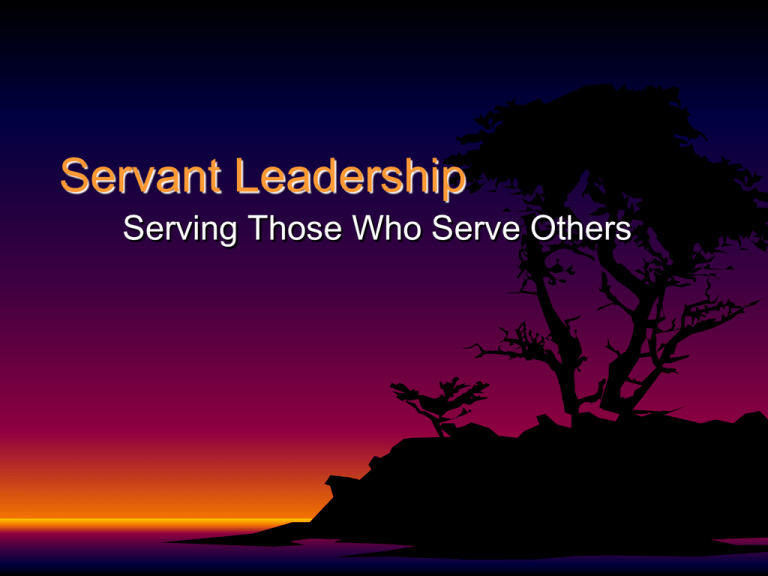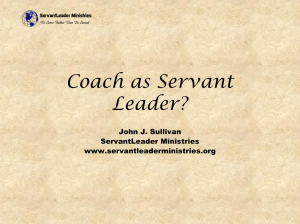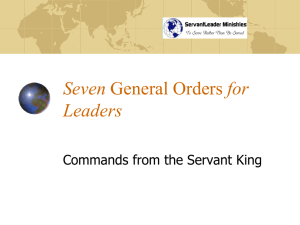Servant Leadership
advertisement

Servant Leadership Serving Those Who Serve Others What is Servant Leadership • Originated in the 1970’s • Used by many large organizations as their leadership foundation • A method of leading others through serving others Why This Model? • Influences people/teams to accomplish common goals • Everyone buys into the success of the team and its goals • Results in powerful outcomes for people and organizations Famous Servant Leaders • • • • • • Jesus Buddha Martin Luther King, Jr. Mother Teresa Mahatma Gandhi Nelson Mandela They had no power but operated from positions of authority and influence to accomplish great things that changed the world. Two Kinds of Leaders • Those that are Leaders first • Those that are Servants first Those That Are Leaders First • • • • • • Top-down Often control others Make all decisions Give orders Possessive about their position Think they own the leadership position Those That Are Servants First • Assume leadership only if they see it as the best way to serve • Called to lead, not driven to lead • Naturally helpful and want to develop people • Not possessive about their leadership position • Surrender the position to further develop others Servant Leaders • Truly have servant hearts • Their focus is to serve those who serve others • Servant leaders may be a leader, follower, or teammate The Servant Leader Purpose • To help people become: • More autonomous • More capable • More effective Servant Leaders • Ask themselves every day: “Who did I grow today?” “Who am I going to grow tomorrow?” The 10 Characteristics of a Servant Leader • • • • • Listening Empathy Healing Awareness Persuasion • • • • Conceptualization Foresight Stewardship Commitment to the growth of people • Building community Take the 10 characteristics of Servant Leader • List one way you will demonstrate each servant leadership characteristic starting today! Listening as a Servant Leader • Servant Leaders listen intently to others • What is being said • What is being left unsaid • Thoughts, ideas, opinions, feelings, concerns • Develop trusting relationships How do you know when someone is listening to you?? Empathy in the Servant Leader • Strives to understand people • Recognizes and accept people • May reject behaviors but never rejects people • Understands diversity – leverages people’s strengths How do you know when someone has empathy with you and your situation? Healing by the Servant Leader • Healing relationships is a powerful force to transform people and situations • Helps the team get along with each other • To better serve the client How do you know when someone is helping to heal relationships?? Awareness in the Servant Leader • Self-awareness and general awareness • Is aware of situations and people • Is willing to “meet people where they are” • Assists in making things right between people How self aware are you??? Persuasion of the Servant Leader • Persuade instead of using positional authority when making decisions • Seeks to convince rather than coerce others • Effective at building consensus within groups • Especially helpful during times of change How do you persuade people? Conceptualization of the Servant Leader • • • • Dream great dreams Think beyond the day-to-day realities Looks at long term goals Balance conceptual thinking and day-today operational thinking Give me an example of conceptual thinking. Foresight as a Servant Leader • Enables the Servant Leader to: • Understand lessons from the past • The realities of the present • Likely consequences of decisions on the future • Rooted in the Intuitive Mind • “Gut feelings” Give me an example of your use of foresight. Stewardship in the Servant Leader • Committed to serving others • Creates the environment that meets the needs of others • Believes in doing things for the greater good of the society • When the needs of the society are met the needs of the individual are met How do you demonstrate Stewardship??? Commitment to the Growth of People • Believe in and seek the intrinsic value people have beyond their tangible contributions as employees • Deeply committed to the growth people • Recognize their responsibility to nurture professional and personal growth in their employees How do you show your commitment to the growth of people? Building Community • Large organizations are the primary shaper of people’s lives • Seek to build community within the organization… • … that meets the needs of all stakeholders How do you help to build community? Finally… Effective Servant Leadership • Begins on the inside of a person with a servant heart and then it moves outward to serve others • Requires the heart to transform others • Creates autonomous, more capable, more effective employees • People and organizations achieve goals









